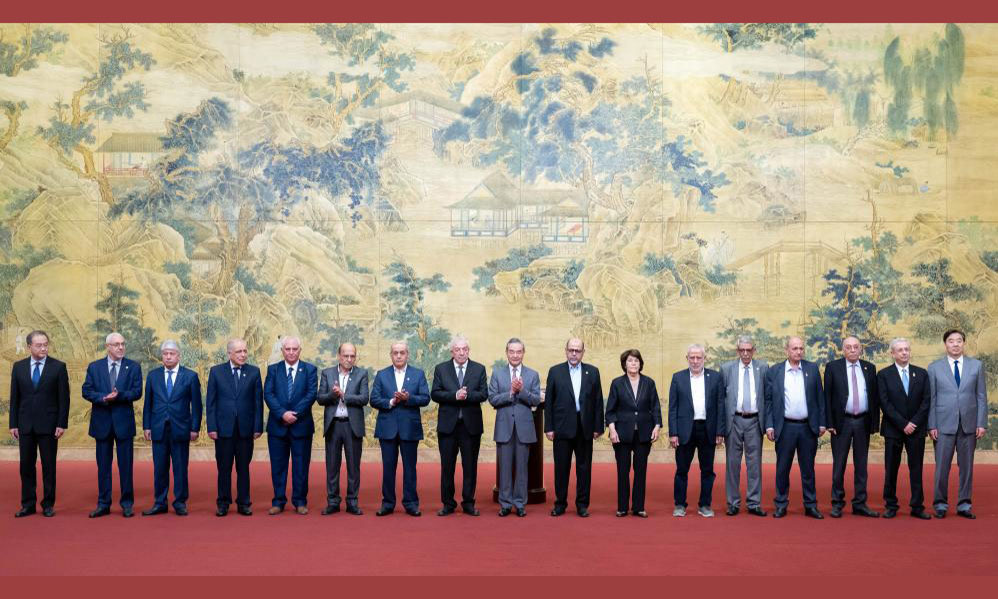China's image as 'peace builder' is highlighted again: Global Times editorial

On Tuesday, Beijing became the focal point of global diplomacy. Representatives of 14 Palestinian factions signed the Beijing Declaration on Ending Division and Strengthening Palestinian National Unity, historically announcing the end of division and the strengthening of Palestinian unity. On the same day, Ukrainian Foreign Minister Dmytro Kuleba began his visit to China, marking the first visit by a Ukrainian foreign minister since the outbreak of the Russia-Ukraine conflict. Parties from two of the world's most significant conflict regions simultaneously seek political solutions in China, forming a "diplomatic resonance." One netizen commented, "The world is in tatters, and China is stitching it back together." While these words may not be entirely accurate, they vividly reflect China's efforts to fulfill the Global Security Initiative and address the deficit in global peace.
The Israel-Palestine conflict and internal Palestinian divisions involve extremely complex backgrounds and interests, making the reconciliation process long and tortuous. The gathering of 14 Palestinian factions in Beijing for reconciliation talks has been met with cautious optimism by mainstream international media. The announcement of the Beijing Declaration immediately shocked international public opinion. Mustafa Barghouti, secretary-general of the Palestinian National Initiative, stated that the Beijing Declaration goes "much further" than any other reached in recent years. The scene of representatives from 14 factions signing the declaration marks an important historical moment in the Palestinian liberation movement and brings valuable hope to the long-suffering Palestinian people.
The Beijing Declaration is a crucial step toward resolving the Palestinian issue and achieving peace and stability in the Middle East. It is also the first time that an internal Palestinian reconciliation document has been organized by a country outside the Arab world. When asked why this conflict can only be resolved in Beijing rather than elsewhere in the world, Mustafa Barghouti said it is because China is "very decent and honest." The sincere efforts made by China to support the rights of the Palestinian people, end division and unify the Palestinian stance have been highly praised by all factions in the Beijing Declaration, which is well-deserved.
The Beijing Declaration also holds transcendent significance. From achieving historical reconciliation last year between Iran and Saudi Arabia to today's Beijing Declaration, the world has witnessed a broader range of possibilities and gained immense confidence. The new security path advocated by China - dialogue rather than confrontation, partnership instead of alliance, and win-win cooperation instead of zero-sum games - has proven to be viable. A world characterized by lasting peace, universal security, common prosperity, openness, inclusiveness, and ecological beauty is attainable. Unraveling knots does not require the sword. Beyond isolation, pressure, sanctions, confrontation, interference, aggression, and mutual destruction, humanity has another path: resolving complex and difficult issues through dialogue and cooperation. Humanity does not have to repeat the mistakes of the past and is not bound to the historical cycles of war and peace, prosperity and decline, order and chaos. The Global Security Initiative advocated by China is a beacon of hope.
The progress in Palestinian internal reconciliation also provides insights into the ultimate resolution of another conflict. Besides discussing China-Ukraine bilateral relations, a key focus of Kuleba's visit to China is seeking ways to end the Ukrainian crisis in discussions with China. Before his trip, Kuleba recorded a video for Chinese netizens, expressing his hope for "real and just peace" and for Ukraine to "restore stable development and prosperity, and security for the people." Promoting a peaceful resolution to the Ukrainian crisis is a consistent stance of China, which has also made significant efforts toward this goal. The door to peace remains open, and for the international community, it is crucial to work toward encouraging peace talks rather than the opposite.
Peace cannot be achieved overnight, and China is aware of the difficulties along the way. However, as long as it benefits the world and its people, China feels an unshirkable responsibility. Currently, the parties involved in the world's two major regional conflicts are in China, both seeking goals related to "peace." This is not coincidental. China's impartial stance, free from selfish motives or interests, has garnered increasing trust from the international community. As a value system and methodology that China offers for global peace, the Global Security Initiative transcends geopolitical and ideological differences, and is the greatest common denominator for all parties seeking peace and reconciliation. Each successful practice of the GSI attracts more like-minded partners and continually validates the ancient Chinese saying: "Virtue is not left to stand alone, and he who practices it will have neighbors."